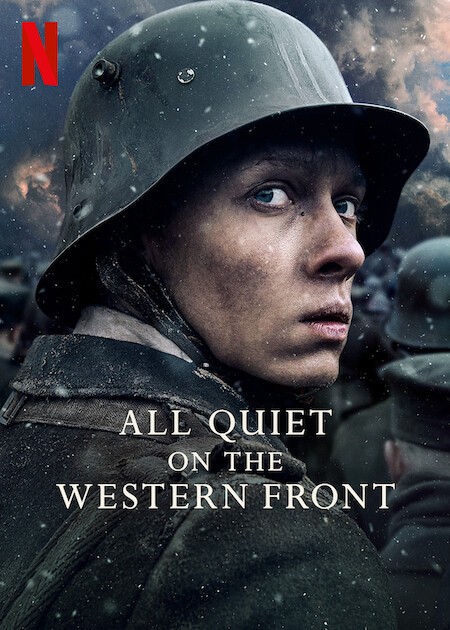All Quiet On The Western Front
Introduction
The weekend is finally here but since most of the major releases were already covered during the week, I did get a chance to explore a bit. And to keep pace with some of the International films doing the rounds, I finished watching the new German film All Quiet On The Western Front which is freshly streaming on Netflix. The Oscar season is slowly heating up and this one is Germany’s official entry to the Academy Awards this year! Now there haven’t been too many films made on World War 1 although you will find a bunch of films made on World War 2. One gem that I remember was the Sam Mendes directed film 1917 that was a visual spectacle and a film so technically sound that it would go down in History as the Best film ever made on World War 1. So when All Quiet On The Western Front did flash on my phone(and credit to Netflix for promoting it as well), I was really curious on what the film had to offer. Now that I have finished watching All Quiet On The Western Front, here are my two cents on it.
Story & Screenplay
Based on a novel by the same name, All Quiet On The Western Front follows the story of a teenager who fakes his age to get into the army fascinated with the idea of fighting for his country. But little does he know that the reality of war is far from what he had ever imagined. Now we may have been privy to many war based films but the beauty of it is that each one of them seem very different from the other(in terms of them being a personal tale), and if made technically well, they would always reach their desired audience. And All Quiet On The Western Front is no different. It is a story which is beautifully told in what turns out to be one of the best anti-war films that I have ever watched. The screenplay standing at just under 150 minutes promises an exhilarating but supremely emotional ride. But little did I know what it had in store for me.
Before I get to the analysis, here is some trivia. The novel on which the film is based on was written by a surviving soldier himself. And so the set of incidents here are all true(although some form of cinematic liberty may have been taken). The film opens on a terrific note with an almost 5 minute one-take sequence of a young soldier trying to survive in the middle of a battle until he meets with his fate. This sequence is brutal and raw and very powerfully written and executed. Soon the drama cuts to a set of youngsters who are fascinated with the idea of fighting a battle. If I could draw a parallel, this is similar to the situation wherein anyone from his living room puts forth his opinion of going for a war! The reality though is far different.
The drama here has a slow but steady buildup of things to come. And this makes for a compelling and engaging watch! To give you a perspective, the youngsters are all thrown into the battlefield suddenly with all the expectations being of fighting a valiant battle instantaneously. The trauma and the fear of the soldiers is perfectly captured in so many scenes. There is a parallel subplot on the behind the scenes negotiations taking place while you get a glimpse of the economical downfall of one of the most powerful countries then. In a scene, you see a soldiers stealing a goose from a farmer. In a totally different scene you see the German soldiers hogging away some food after killing off their counterparts. It does make for a disturbing watch.
The battle combat scenes are one of the best that I have seen recently. The sheer execution makes you a bystander wherein all the action takes place. It is hard-hitting and beautifully choreographed, almost like poetry in motion. This would have been a big screen experience like no other, but alas! But there are other beautiful moments in the screenplay. In a scene, one of the young protagonists impulsively stabs his counterpart only to realise his actions. And in the same emotionally moving scene, he apologises to his corpse after desperately trying to save him. This while all his friends have died in the battlefield.
The element of trauma is brutally captured here. In a scene, a soldier after being injured and tired of the war, chooses to commit suicide, this while the high command dictates that the war should continue despite signing a treaty(and killing those who opposed his decision). The battle in the final scene is a sight in itself. The protagonist, having lost all his friends now, is shown to be ruthless and without emotions. But at the end of it all, when in a turn of events, a similar situation plays out with him at the receiving end, it makes you ponder – War But At What Cost! The film leaves you with a soul stirring line – almost 17 million people lost their lives in World War 1, some while fighting for the Western Front(where the war did take place) which barely extended to 100 metres. Gut Wrenching in what was one of the finest anti-war screenplays I have ever witnessed, keeping the message subtle without imposing its thoughts.
Dialogues, Music & Direction
The dialogues are subtle but very impactful. I would like to take a moment and applaud the magnificent BGM that adds several layers of intrigue and tension to the drama. Perhaps the best score that I have heard for an anti-war film! The cinematography and editing are the two unsung heroes of the drama. The film is grand and visually beautiful and much credit needs to go to the technical department for managing the aesthetics wonderfully well. Director Edward Berger has done a stupendous job here in creating this piece of art that shall be adored for years to come. The execution here is pitch perfect that always engages the audience right throughout. The direction is excellent here.
Performances
The performances are outstanding here. Daniel Bruhl as Matthias and Aaron Hilmer as Kropp have their moments to shine. Moritz Klaus as Muller and Albrecht Schuch as Kat are outstanding. But it is Felix Kammerer as Paul who is terrific and brilliantly showcases his vulnerabilities. His character also has an interesting arc which means he has different emotions to play with and he does a wonderful job.
Conclusion
All Quiet On The Western Front is perhaps the best anti-war movie I have ever seen. Do not miss this gem! Available on Netflix and Highly Highly Recommended!




